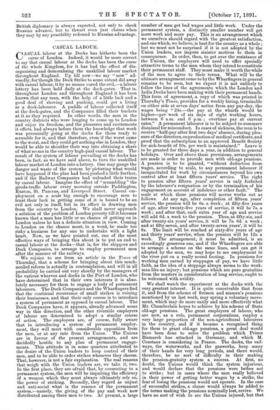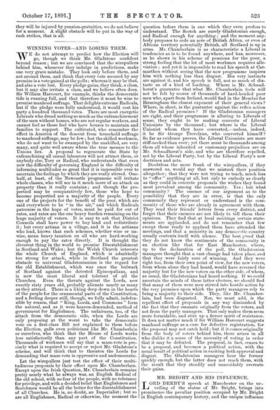CASUAL LABOUR.
CASUAL labour at the Docks has hitherto been the curse of London. Indeed, it would be more correct to say that casual labour at the docks has been the curse of the whole Kingdom, for it has had the effect of dis- organising and demoralising the unskilled labour market throughout England. Up till now—we say " now " ad- visedly, for though the Dock Strike to some extent did away with casual labour, it by no means cured the evil,—a labour lottery has been held daily at the dock-gates. That is, throughout London and throughout England it has been known that any man, with the help of a little luck and a good deal of shoving and pushing, could get a living as a dock-labourer. A puddle of labour collected itself at the dock-gates, and the Companies filled their buckets at it as they required. In other words, the men in the country districts who were longing to come up to London and enjoy its freedom, and the pleasures and excitements it offers, had always before them the knowledge that work was perennially going at the docks for those ready to scramble for it, and that therefore, even if the worst came to the worst, and they could get nothing else in London, they would be able to shoulder their way into obtaining a share of what seems in the country high-paid casual labour. The result of the system of labour prevailing at the docks has been, in fact, as we have said above, to turn the unskilled labour market of London into a lottery. One may gauge the danger and waste of the system by picturing what would have happened if the plan had been pushed a little further, and if the Railway Companies had unloaded their trains by casual labour. Imagine the effect of " scrambling" the goods-traffic labour every morning outside Paddington, Euston, St. Pancras, and Liverpool Street. Casual em- ployment on a scale big enough to encourage men to trust their luck in getting some of it is bound to be an evil not only in itself, but in its effect in drawing men from the country to London. We shall never approach a solution of the problem of London poverty till it becomes known that a man has little or no chance of getting on in London unless he has a definite situation in view. Coming to London on the chance must, in a word, be made too risky a business for any one to undertake with a light heart. Now, as we have pointed out, one of the most effective ways of bringing this about is to put an end to casual labour at the docks—that is, for the shippers and Dock Companies, to arrange to employ permanent men after the manner of the railways.
We rejoice to see from an article in the Times of Thursday, that a scheme for bringing about this much- needed reform is actually in contemplation, and will in all probability be carried out very shortly by the managers of the various wharves and docks in the Port of London, who have determined that in their own interests it is abso- lutely necessary for them to engage a body of permanent labourers. The Dock Companies and the Wharfingers find that the continual recurrence of small strikes is ruining their businesses, and that their only course is to introduce a system of permanent as opposed to casual labour. The Dock Companies have, it appears, already advanced some way in this direction, and the other riverside employers of labour are determined to adopt a similar course of action. The employers are, of course, fully aware that in introducing a system of permanent employ- ment, they will meet with considerable opposition from the men, or at any rate from the Union. The Unions are in favour of the present arrangements, and are decidedly hostile to any plan of permanent engage- ments. This attitude is in some quarters attributed to the desire of the Union leaders to keep control of their men, and to be able to order strikes whenever they choose. That, however, is not a fair explanation. The real reasons that weigh with the Union leaders are, we take it, two. In the first place, they are afraid that, by consenting to a permanent system, the men will be impairing the efficiency of a weapon which they must always ultimately rely on, the power of striking. Secondly, tiley regard as unjust and anti-social what is the essence of the permanent system,—namely, the giving of the pay and work now distributed among three men to two. At present, a large number of men get bad wages and little work. Under the permanent system, a distinctly smaller number will get more work and more pay. This is an arrangement which we ourselves should regard with the greatest satisfaction, and one which, we believe, is best for the country as a whole ; but we must not be surprised if it is not adopted by the Union leaders, nor impute sinister motives to them in consequence. In order, then, to get over the resistance of the Unions, the employers will need to offer specially attractive terms to the men whom they intend to constitute their permanent staff. They must make it worth the while of the men to agree to their terms. What will be the ultimate arrangement come to by the Wharfingers in general remains to be seen, but we expect it is not unlikely to follow the lines of the agreements which the London and India Docks have been making with their permanent hands. This form of agreement, a copy of which was printed in Thursday's Times, provides for a weekly hiring, terminable on either side at seven days' notice from any pay-day, the wages being " 24s.—the pay at the wharfs would be higher—per week of six days of eight working hours, between 6 a.m. and 6 p.m. ; overtime pay at current rates." A permanent labourer is to be subject to summary dismissal for misconduct. In cases of sickness, the man is to receive "half-pay after first two days' absence, during plea- sure of the directors, on production of medical certificate, and proof that the subscription to an approved Benefit Society for sick-benefit of 10s. per week is maintained." Leave is to be granted for three days a year, in addition to general holidays. Over and above these provisions, arrangements are made in order to provide men with -old-age pensions. A pension is to be granted, "without deduction from wages, according to scale, to any •permanent labourer if incapacitated for work by circumstances beyond his own control after at least fifteen years' service. The right to pension after fifteen _;years' service is only forfeited by the labourer's resignation or by the termination of his engagement on account of indolence or other fault." The scale at which these pensions will accrue works out as follows. At any age, after completion of fifteen years' service, the pension will be 6s. a week ; at fifty-five years of age, after twenty-five years of service, it will be 7s. a week ; and after that, each extra year of age and service will add 6d. a week to the pension. Thus, at fifty-six, and after twenty-six years' service, it will be 7s. 6d. a week ; and at fifty-seven, and after twenty-seven years', it will be 8s. The limit will be reached at sixty-five years of age and thirty years' service, when the pension will be 12s. a week. The arrangement, it must be admitted, is an exceedingly generous one, and if the Wharfingers are able to arrange a scheme on the same lines, and can get it adopted by the men, we may hope to see employment in the river put on a really sound footing. In pensions for working men earned by stoppages of pay, we have little faith, as the idea of a stoppage always seems to the work- man like an injury; but pensions which are pure gratuities from the masters in consideration of long service, ought to be welcomed with avidity.
We shall watch the experiment at the docks with the very greatest interest. It is quite conceivable that from it, and from the scheme of firemen and seamen's pensions mentioned by us last week, may spring a voluntary move- ment, which may do more easily and more effectively what Mr. Chamberlain hopes to achieve by his scheme of State old-age pensions. The great employers of labour, who are now, as a rule, permanent corporations, employ a very large proportion of the non-agricultural labourers in the country, and if it became a recognised thing for them to grant old-age pensions, a great deal would have been done to solve the problem which Prince Bismarck has attacked in Germany, and which M. Constans is considering in France. The docks, the rail- ways, the waterworks, and the gasworks, keep many of their hands for very long periods, and there would, therefore, be no sort of difficulty in their making the pension-gratuity system a success. At first, no doubt, the Unions would think the system injurious, and would declare that the pensions were bribes not to strike ; but in cases where the men really believed in their power of getting better wages by a strike, the fear of losing the pensions would not operate. In the case of successful strikes, a clause would always be added to the terms making the pensions nominally lost, revive. We have no sort of wish to see the Unions injured, but that they will be injured by pension-gratuities, we do not believe for a, moment. A slight obstacle will be put in the way of rash strikes, that is all.



































 Previous page
Previous page